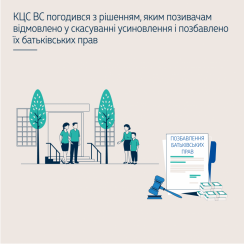Contact center of the Ukrainian Judiciary 044 207-35-46

The plaintiffs adopted a minor child, later the boy began to show character defects, some inappropriate behavior was observed, so they asked the court to cancel the adoption. The tutorship and guardianship authority filed a counterclaim to deprive the adoptive parents of their parental rights and collect alimony due to the improper performance of their parental duties.
The court of first instance dismissed the initial claim and partially satisfied the counterclaim, because before the adoption, the future parents had been aware of both the child's health condition and the peculiarities of his behavior caused by a difficult childhood.
The court of appeal overturned the said court decision and satisfied the initial claim, stating that, regardless of the will of the adoptive parents, they cannot live together with the child and fulfill parental responsibilities. The counterclaim was rejected.
The Supreme Court composed of a panel of judges of the Third Judicial Chamber of the Civil Cassation Court overturned the judgment of the court of appeal and upheld the decision of the court of first instance, making the following legal conclusions.
In accordance with part 1 of Art. 238 of the Family Code of Ukraine, the court may cancel the adoption, in particular if, regardless of the will of the adopter, the adopter and the child have developed such relations that make it impossible for them to live together and for the adopter to fulfill his parental duties.
According to Art. 3 of the Convention on the Rights of the Child, in all actions concerning children, primary attention is paid to the best possible provision of the child's interests. In accordance with parts 1, 4 of Art. 14 of the European Convention on the Adoption of Children, adoption can be cancelled only on the grounds of serious circumstances provided for by law.
The court found that even before the adoption, the boy had been temporarily placed in the family of the plaintiffs in order to get to know him better, the psychologist had provided practical recommendations to the spouses, he had drawn their attention to the fact that the child had certain behavioral characteristics. After the adoption, the child lived in the family of the plaintiffs for two and a half years.
After the deterioration of the relationship with the child, the adoptive parents did not visit any specialists to determine the reasons for the boy's inappropriate behavior, and avoided providing help in resolving the issue of his psycho-emotional state. They returned the boy to the body of tutorship and guardianship and thereafter did not visit him, nor were they interested in his health and development, although they continued to be his parents and had the relevant rights and obligations in relation to the child.
The Supreme Court also stated that special attention should be paid to the issue of depriving the adoptive parents of their parental rights, since they became parents as a result of their personal manifestation of will.
At the same time, the court of appeal also violated the rules of procedural law, since it did not indicate which new evidence, contrary to the conclusions of the local court, the non-submission of which to the court of first instance was due to valid reasons, constituted the grounds for the adoption of a new court decision. And having reassessed the evidence that was evaluated by the local court in compliance with the requirements of the procedural law, the court of appeal did not indicate in the appealed court decision what violations of the norms of procedural law had been committed by the court of first instance and what they consisted of, as well as what norms of substantive law had been incorrectly applied and what is this misapplication.
Thus, the Civil Cassation Court within the Supreme Court upheld the decision of the court of first instance, which denied the plaintiffs the annulment of the adoption, instead depriving them of their parental rights and collected alimony from the spouses in favour of the person (institution) who would act as the legal representative (adoptive parent) of the child.
Resolution of the Supreme Court of June 23, 2022, in case No. 175/1713/20 (proceedings No. 61-189св22) – https://reyestr.court.gov.ua/Review/105139632.
This and other legal positions of the Supreme Court can be found in the Database of Legal Positions of the Supreme Court - lpd.court.gov.ua/login.